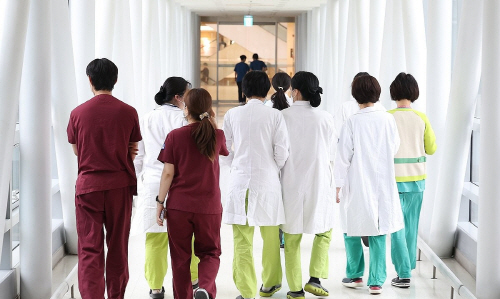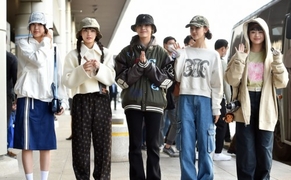 |
| Medical staff are walking at a large hospital in Seoul on March 29 amid trainee doctors’ prolonged collective action. / Source: Yonhap News |
AsiaToday reporter Seol So-young
Patients vented frustration and complaints over delayed or postponed treatment schedules Sunday as trainee doctors stayed away from their jobs for the 41st day in protest of the government’s plan to hike the medical school enrollment quota. Jang, a 46-year-old breast cancer patient who visited Seoul National University Bundang Hospital on Sunday for her seventh chemotherapy, failed to receive the treatment. “I am receiving anticancer treatment, but I am in despair as the treatment has been delayed due to the medical crisis,” Jang said.
Patients are hardly hit by the prolonged medical crisis. More and more emergency patients are dying after being denied receiving emergency treatment as higher general hospitals are reducing treatment services.
On Saturday, a 33-month-old female child who was rescued from cardiac arrest died after being denied transfer to a higher general hospital. The child patient needed emergency surgery immediately after the rescue, but all five high-level general hospitals in Chungcheong provinces and Gyeonggi Province, denied the request. The child fell into cardiac arrest and died that day. A similar incident occurred three days ahead. A patient in her 90s in Busan who failed to receive treatment after being denied from all the university hospitals in the region, moved to Ulsan but eventually died. The Ministry of Health and Welfare said that the death had nothing to do with the resignation of trainee doctors, but concerns are growing among patients.
“Currently, patients with recurrence of cancer, and patients whose mild disease has worsened to severe ones, are unable to raise problems with doctors or hospitals because they need to be treated. Patients are in a sensitive situation,” Ahn Ki-jong, head of Korea Alliance of Patients Organization, said. “Trust in the treatment that patients have with doctors is very important, and if this incident starts to break the trust, it will be a really big loss.”
As the medial school admissions quota issue has become a social black hole, the revitalization of local and essential medical care has long been put behind. The government has pushed for dialogue with the medical community, saying it will seek a “flexible handling” of the suspension of licenses, but remains firm with its plan to increase med school enrollment by 2,000. The fatigue of medical professors has exceeded their limits with prolonged departure of junior doctors. Medical professors decided to reduce their weekly work hours to 52.
While the dialogue between the government and doctors in on the “parallel line,” the gap between the government and the ruling party ahead of the April 10 general election is worsening. Although the ruling People Power Party is calling for a review of the government’s plan to increase medical school admissions quota by 2,000 to settle down the public sentiment, the government is still sticking to its plan.
Patients and citizens are expressing great disappointment to the government and doctors who have not even set up a negotiating table. “I don’t know why they are going on strike when it’s hard to make ends meet. It is only citizens who get all the discomfort,” said a 35-year-old Seoul citizen.
#patients #emergency room #doctors #strike
Copyright by Asiatoday
Most Read
-
1
-
2
-
3
-
4
-
5
-
6
-
7





















